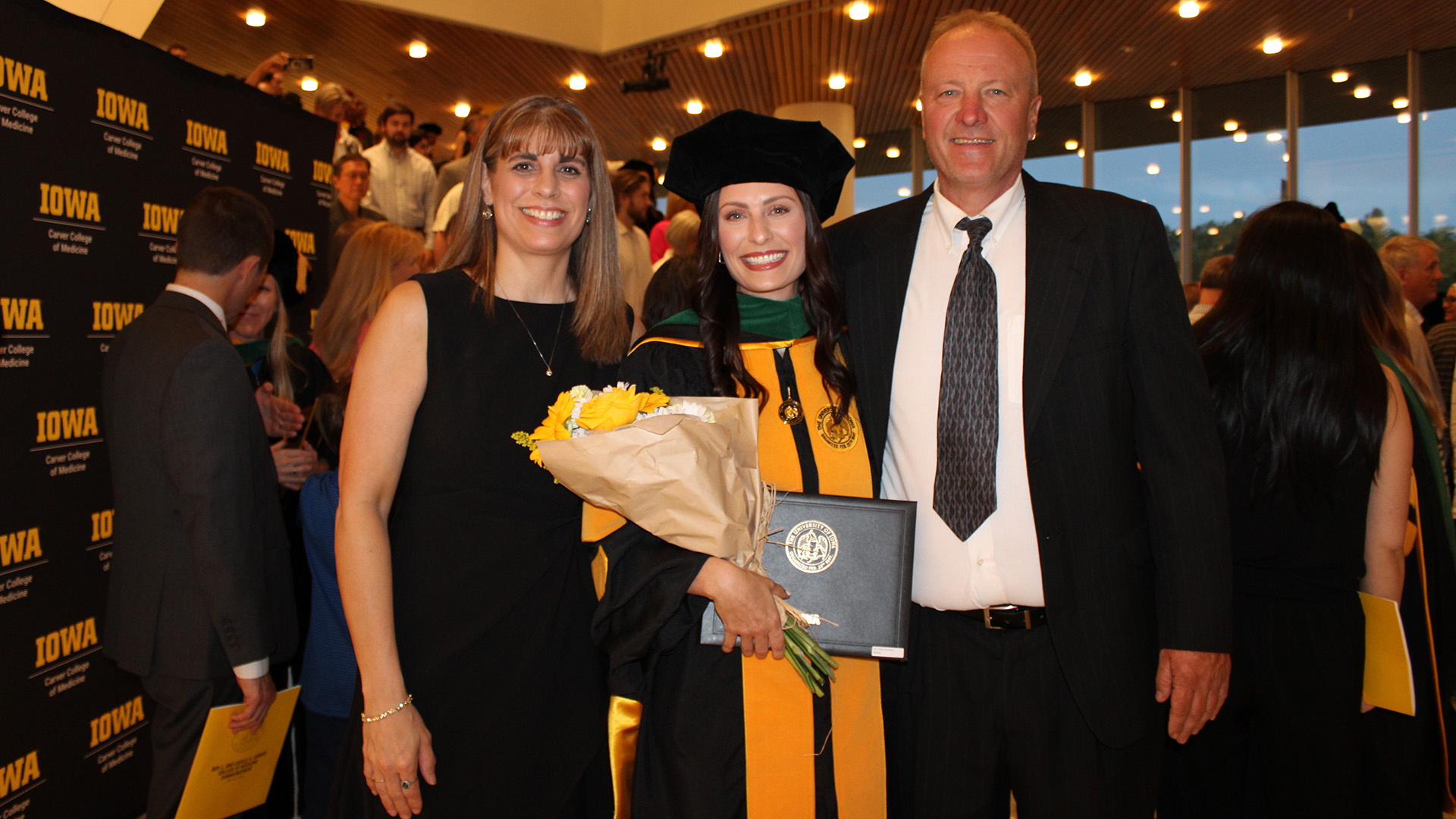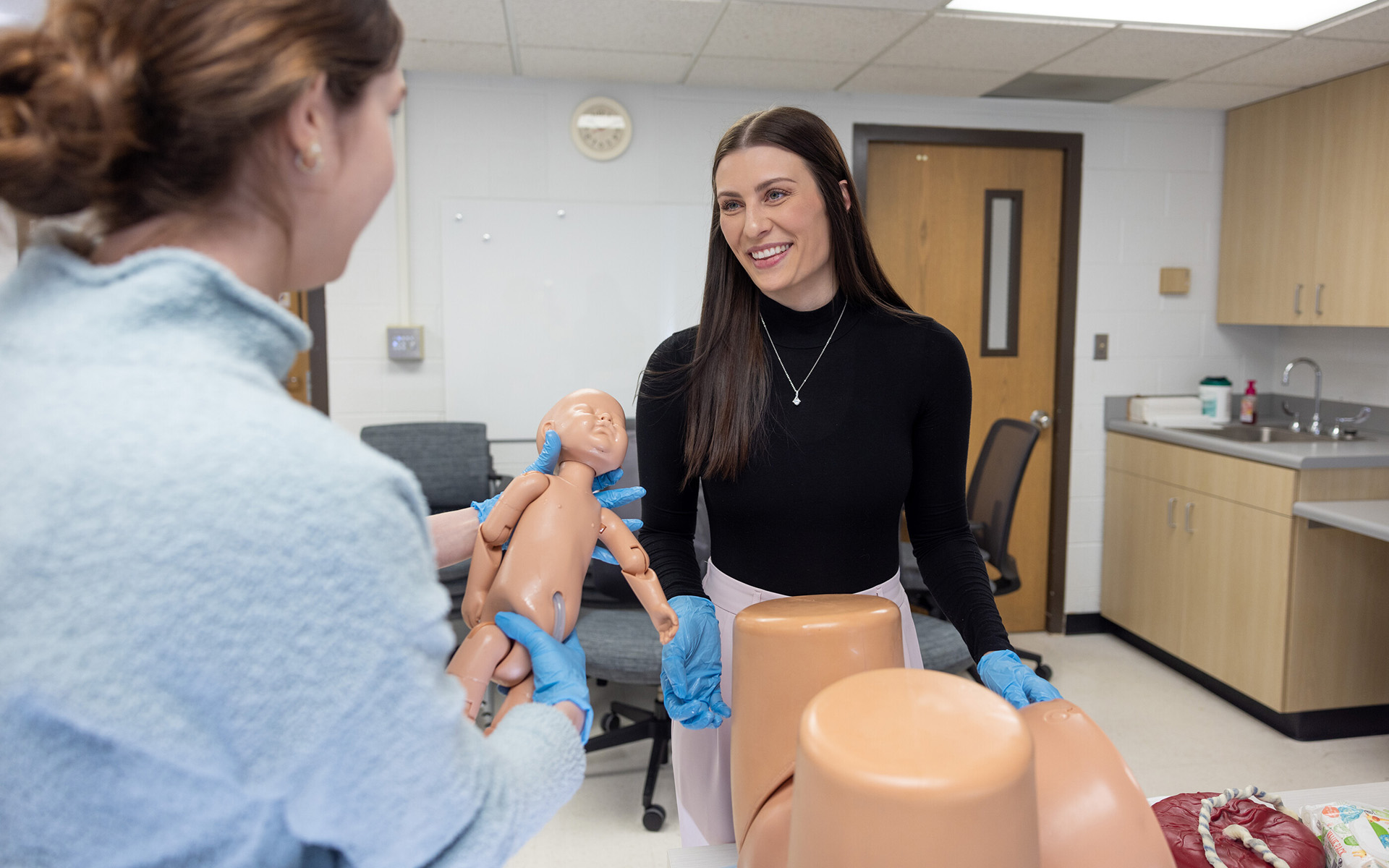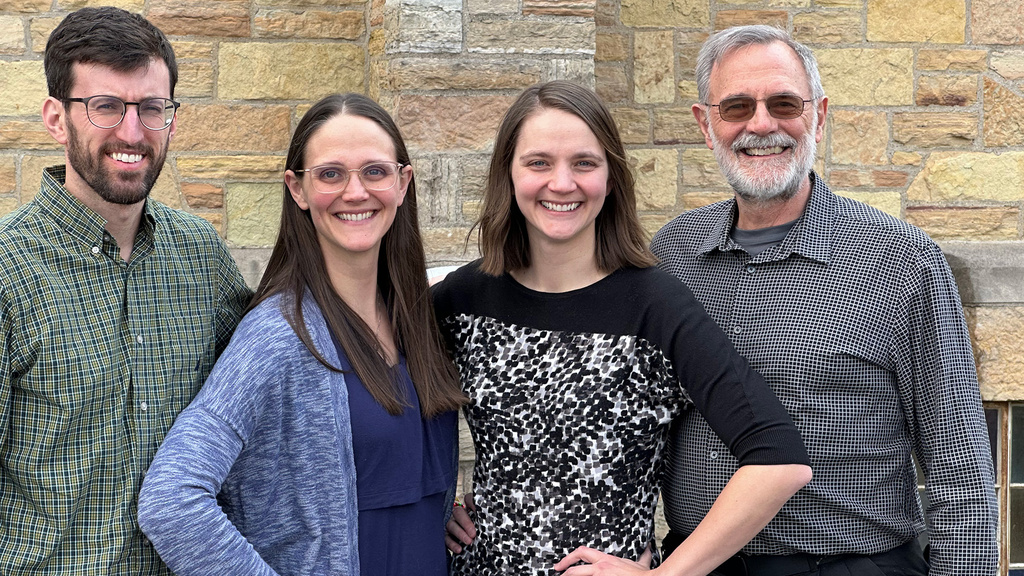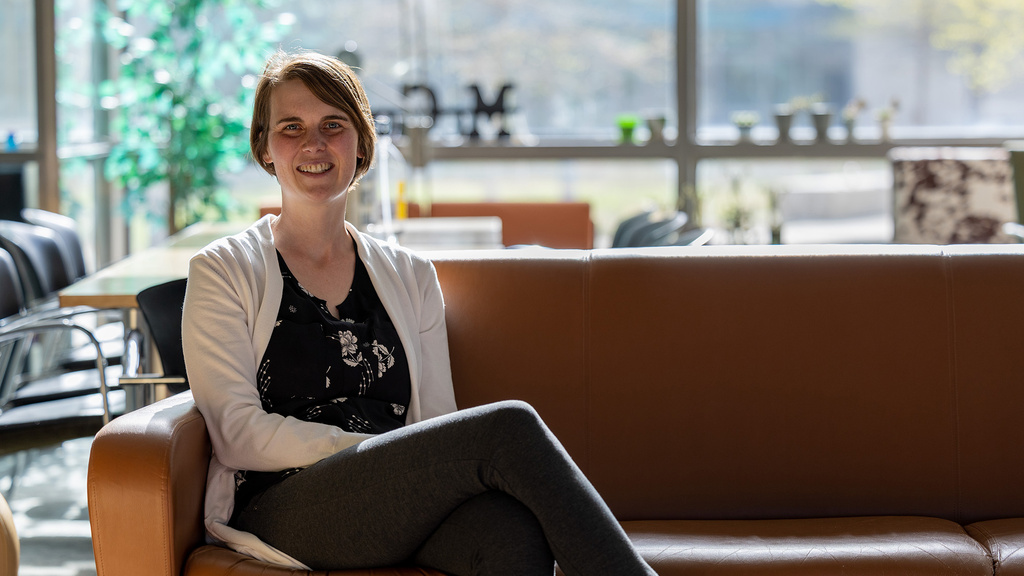Ashley Hurd-Jackson’s first deliveries were pigs on the family farm. Now she is training to deliver babies — and better access to care — across rural Iowa.
Story and photography: UI Health Care Marketing and Communications
Published: Nov. 10, 2025
For Ashley Hurd-Jackson, MD, the values that guide her as a physician began long before medical school. It started on her family’s farm in Cleghorn, a northwest Iowa town that’s home to about 230 people.
“I got the opportunity to help my dad deliver baby pigs, starting when I was 11 years old,” she says. “That’s where my interest in obstetrics originally started, on the farm.”
Growing up, she was drawn to the connections in her rural community. Everyone knew everyone.
“I feel like that is something that’s super unique and special to small-town Iowa,” she says.
A family nurse practitioner Hurd-Jackson saw as a child made a lasting impression, and they developed a great connection. She says the provider was invested in her entire family, which helped her feel welcome and comfortable.
Those experiences led Hurd-Jackson to the University of Iowa Carver College of Medicine where she took part in the Carver Rural Iowa Scholars Program (CRISP), an initiative to prepare medical students for careers in rural health care. After earning an MD in May 2025, she began her obstetrics and gynecology residency at UI Health Care, where she is now in her first year of training.

Ashley Hurd-Jackson, seen here with her parents at commencement, aspires to practice in a rural Iowa community. “I deeply value building connections with my future patients and developing genuine relationships where I get to know them as a person, not just as a patient in my office.”
Finding her calling
The sense of connection Hurd-Jackson felt with her nurse practitioner and in her community is what ultimately drew her to medicine.
“I think it was a culmination of all of my experiences on the farm,” she says. “I realized I could channel my love for medicine into serving others as a physician.”
When she discovered obstetrics and gynecology, everything clicked.
“Iowa ranks last in all 50 states for OBGYN per capita, and about a third of Iowa’s counties are considered to be maternity care deserts,” Hurd-Jackson says. “That was something that really stuck with me and made me think about how some patients in our state don’t have access to the care that they need, whether that be reproductive care or maternity care throughout their pregnancy.”
Even in Iowa City, she says, the effects of those gaps are clear. Hurd-Jackson notices that most UI Health Care patients are from outside of Johnson County.
“They are traveling 30 minutes or an hour, or even more, to get the care that they need and deserve,” she says.
The role of CRISP
Hurd-Jackson joined CRISP to turn her passion for rural health into practice.
“Throughout that program, I was able to connect with a rural OBGYN in eastern Iowa,” she says. “I even got to travel with her to other small areas, as well.”
CRISP, which started in 2012, combines mentoring, community-based rotations, and loan-repayment incentives of up to $100,000 for graduates who return to practice in qualifying Iowa communities for five years.
The financial support built into CRISP helps make rural practice a real option for aspiring physicians.
“They want to settle down, buy a home, and start a family, and finances play a huge role in where they choose to practice,” says Gerry Clancy, MD, senior associate dean of external affairs at the Carver College of Medicine. “That’s why debt becomes not just a personal challenge but a workforce issue for the whole state.”
CRISP is one of several ways UI Health Care is directly addressing a physician shortage in Iowa. Rural areas are seeing some of the biggest impacts, with some women driving long distances to deliver their babies.
UI Health Care recently expanded CRISP from four to eight students per class. Of the students who were involved in CRISP and have completed residency, 83% are currently practicing in Iowa. Of those CRISP graduates in Iowa, 86% currently practice in rural Iowa. The number will grow to 93% in early 2026 after an alumna completes her fellowship.
83 %
who have completed residency currently practice in Iowa
86 %
practice in rural areas of the state
Connecting medical students with mentors from rural Iowa
For her CRISP capstone project, Hurd-Jackson collaborated with three classmates to create a statewide database of rural providers willing to serve as mentors for medical students.
“We thought it would be valuable if we had a list of rural providers organized by specialty,” she says. “When you think of rural medicine, you may just think about family medicine, but there are also general surgeons and OBGYNs who are part of rural health care, too.”
The team reached out to hospitals and clinics across Iowa to identify potential mentors. The goal was to make it easier for students, especially those without rural backgrounds, to find mentors and see the full spectrum of rural medicine. Hurd-Jackson and her colleagues listed each prospective mentor’s profession and contact information so students could reach out and establish a connection in those communities.
“The earlier you establish a mentorship and a relationship, the more you open your eyes to the possibility of working in a rural area,” she says.
Another component of Hurd-Jackson’s capstone project focused on maternal health education.
“I noticed in even my small community that there were multiple women who were diagnosed with preeclampsia and were not aware of what the signs and symptoms were,” she says. “That made me realize that there may be an education gap.”
With support from faculty mentors, Hurd-Jackson developed a preeclampsia awareness project that partnered with two hospitals in northwest Iowa to distribute informational magnets to patients during prenatal visits.
Patients who received a magnet were better able to identify the signs, symptoms, risk factors, and complications of preeclampsia — and demonstrated greater knowledge of what to do if they developed symptoms — compared to those who did not receive a magnet.
One woman who received the magnet later shared that when she experienced a symptom listed on the magnet, she felt comfortable reaching out to her doctor. The woman was later diagnosed with preeclampsia and delivered her son at 36 weeks’ gestation. Mom and baby are now doing well.
“The thought that my project could make a difference, even for one patient, made it all worthwhile,” Hurd-Jackson says.
She hopes to build on both efforts in residency, continuing her work to strengthen rural maternal health care and mentorship for future physicians.

Ashley Hurd-Jackson took part in the Carver Rural Iowa Scholars Program (CRISP) while at the University of Iowa Carver College of Medicine. The Cleghorn, Iowa, native plans to practice in rural Iowa when she completes her training.
Looking ahead
When Hurd-Jackson pictures her future, she envisions herself right back where she started, serving a rural Iowa community.
“After residency, I see myself in a small community in Iowa, hopefully similar to the one that I grew up in,” she says. “I deeply value building connections with my future patients and developing genuine relationships where I get to know them as a person, not just as a patient in my office.”
A real-world experience early in her residency training confirmed that she had found her place.
“The very first delivery I was part of was with a family medicine doctor,” she says. “He allowed me to perform the entire delivery, and it was an incredible experience — the first of many meaningful moments in my training. Being trusted to participate in such an intimate, life-changing moment is both a profound privilege and reminder of why I chose OBGYN.”
Hurd-Jackson and her classmates are exactly the kind of physicians CRISP is designed to support.
“By the time they graduate, they aren’t just prepared to practice — they’re motivated,” says Cody Pritchard, MSEd, the co-director for CRISP. “They’ve seen the need firsthand, often through their own families. That’s what keeps them here.”
For Hurd-Jackson, that mission feels personal.
“It feels like everything has come full circle,” she says. “I can take my interests and career aspirations that I’ve had since I was little and turn them into an actual reality — to become a rural OBGYN and have the opportunity to serve communities that need it most.”




